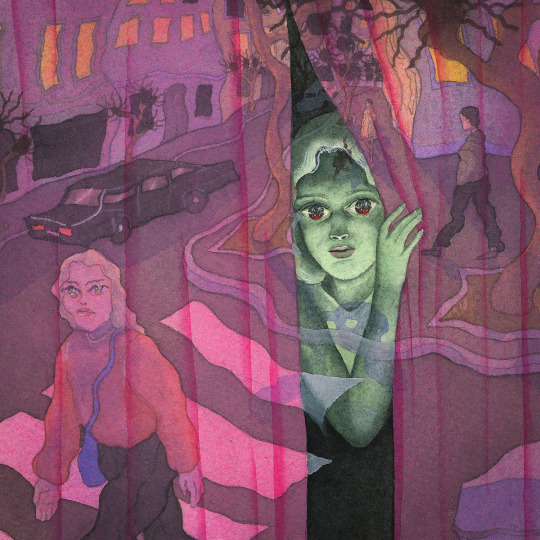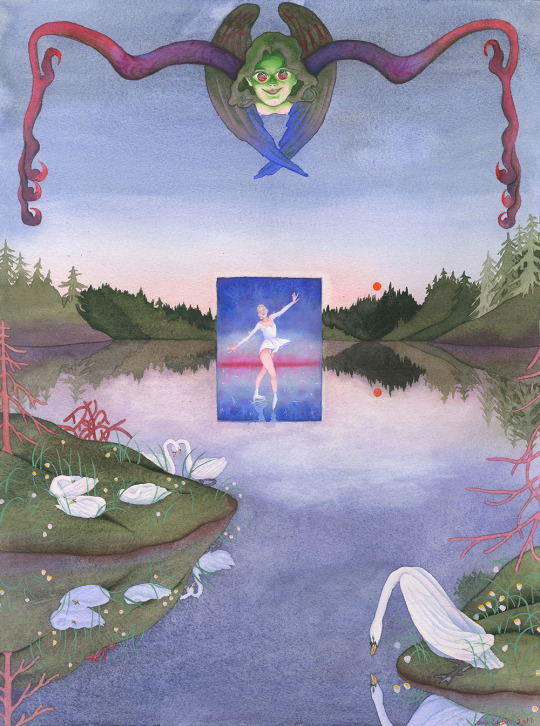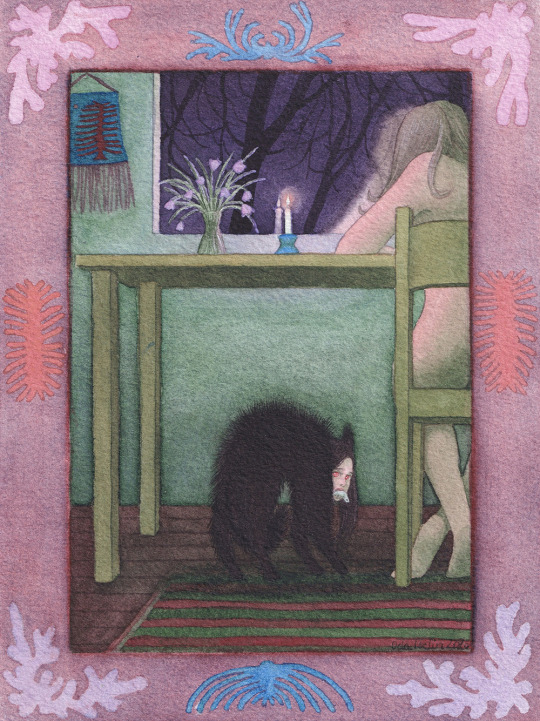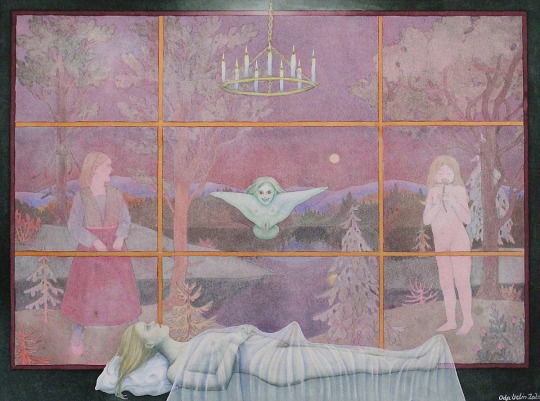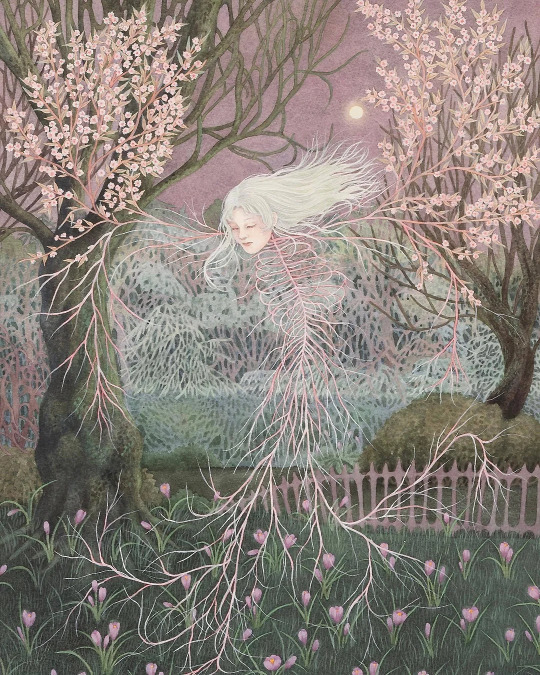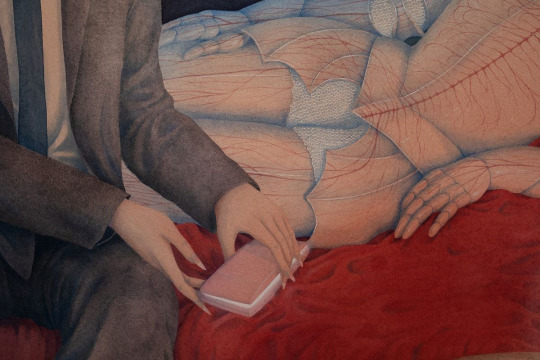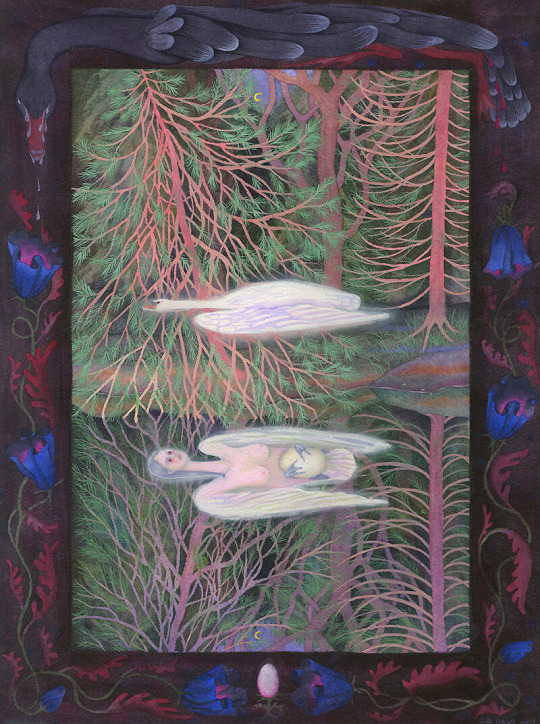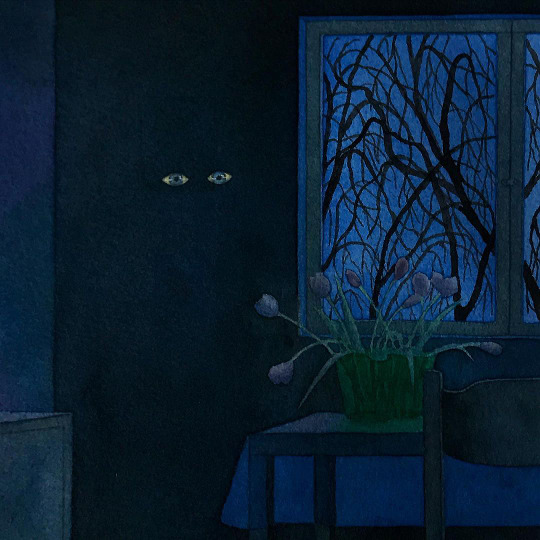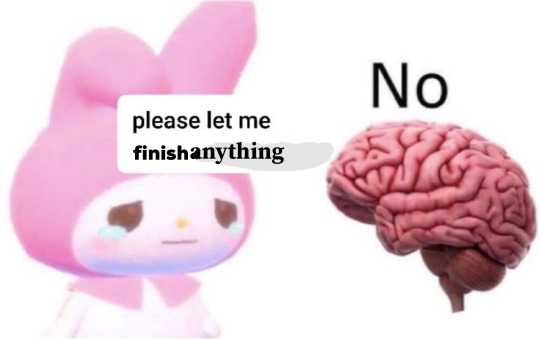Text
In my experience, depression is what happens when I don't trust myself, when I don't take myself seriously, when I believe that there are things I 'should' believe and things I 'should' do and ways I 'should' behave. My depression felt like a form of rebellion against the world that says I should be fine with my childhood, or maybe even have deserved what happened to me - but I now understand that my depression was not a rebellion but rather a panicked outsourcing of my pain. If I keep the misery going, if I can make grandiose statements on the nature of how messed up life is, if I can just show them, show them all, that I am *not* happy and this is *not* how life should be... then I've made my sadness meaningful because it has a justification that can be universally understood and acknowledged, and I've found 'proof' that I deserve to be sad because other people can feel empathy for me. I made my sadness so big because the idea that I was sad about something that I percieved to be small - or, I was worried others would percieve it to be small - was so humiliating it wasn't even worth addressing. I couldn't just trust myself, take my own sadness seriously - it had to be worth something to someone else, it had to be bigger than me. The eventual realisation I had to make is that my emotions are my own: I'm allowed to be sad, to be angry, to be irritated, about whatever the hell I want - and this only becomes a 'pathology' when I suppress it and either cover it up with comfort-seeking, or only allow it to come out in the form of a huge grandiose breakdown worthy of a gothic novel, or obsess over trying to 'prove' it right, procrastinating on ever feeling it fully. Depression, for me, was the result of procrastinating on my own feelings until I reach periods where I cannot take it anymore. It's a lack of honesty, a feeling that the only value of my emotions is to some external judge. Instead, I came to recognie that my feelings are mine and they're worth something purely because they're mine and I can have weird opinions and be opinionated and that's just being a person and having a personality. Depression was how I chipped away at myself because I was terrified and humiliated over the reality of me simply being a normal human being and generating meaning through something as mundane as my normal human life and giving it value simply because it's my life.
In many ways, my depression, symbolic state of mind, and pathological demand avoidance all have this void of personality as the origin. Saying 'I have depression' makes it sound as if depression is an addition to your personality; a tumour that should be artificially removed. But my depression is an attempt to make meaning where I was specifically avoiding seeking meaning in my own mundane life. It is an attempt to justify my emotion because I see my emotions as a personal failing. It is an outsourcing of my personhood to some nebulous watcher and judger, who I can meet at the pearly gates and can tell me I achieved success as a person - I was disciplined, I was moral, I did everything right. Even my thoughts were right, because I'd made sure of that, and my emotions were right, as I'd put them under constant examination and reflection. The symbolic state of mind requires that there is an external judgment, just as pda does, just as, so I found, depression does. All of them exist inside my mind to address the exact same problem: that as a person, I do not feel that I exist for me - I'm put on this earth to be a problem-solver, and because I think and feel deeply, I have an obligation to be 'of use' to the rest of the world. After all, if you look at it logically, I am but one person, and if it's my minor discomfort vs the discomfort of others then it's one versus many, and the many takes precedent over the all. But it went deeper than that - I was so disconnected from my reality as a human being that my conscious self percieved 'me' as a category of person to take into consideration when making my moral and logically correct decisions. So I would go to a restaurant and think 'this is what drbased would like, so I will order that - oh no, but that's really pricey and drbased doesn't like to pay that much, so I guess I should go for the cheaper option? Oh, now I feel really bad for some reason...', or go to boardgaming event and think 'drbased likes this game, but also drbased likes those people playing that other game - so, holy shit, which should I chose??? what's the right decision to make??? what ticks the most boxes???' I never consciously thought of myself in the third person, but after much introspection I realised that that's ultimately the attitude I went into everything with: every decision had to be weighed up against all factors of varying importance, and every time something didn't turn out perfectly I'd be left with this itching sense of disappointment that could follow me for days, months or even years.
Symbolic state: provides the sense of external judgement; my spiritual beliefs planted in me an idea that I could treat life like a perpetual classroom, and I could use external stimuli as 'proof' I was doing life correctly. This provides the underlying mechanism in which I lose the wisdom of understanding that I exist and make choices for me. There's a simplicity to it - I don't have to worry about anything as measly and pathetic as my feelings, and instead I make my decisions based on a set of moral and logical rules that, if for some reason it could ever happen, I could defend fully in court. And in turn, instead of feeling any real sense of satisfaction, achievement, and self-love, I could instead turn life into a collection of stimuli that gave me a euphoric buzz. Symbolic states became the mechanism by which I lost myself and also the mechanism by which I could cope with losing myself.
Depression: I now understand that I first developed depression when I believed that leaving school and starting university would magically change my whole life and make me feel entirely different in some nebulous way. Ironically, that actually did happen, but clearly not to the extent that I ever wanted to admit to myself - it's embarrassing to admit to myself that I wanted something impossible, so instead of ever accepting that fact about me, I suppressed it, and thus began the obsessive process of constantly re-evaluating everything that happens to me so I decide if I'm 'allowed' to feel negative about it or not.
PDA: The seeds of PDA were planted as a teenager but the feeling of unease truly started to grow from when my depression started and reached its height about 6-ish years ago. I started off with a very specific life goal, but hindsight is 20-20 and I had no idea at the time how much I was internalising this idea that everything I do is up for scrutiny, that I'm not allowed to be a flawed human being with weird opinions and habits. Everything I did had to be quirky, had to be aesthetic (feeding into, and fed by, the symbolic states), had to be meaningful by some exterior metric. By the time I was in my early 20s I had noticed that everything I did was highly calculated and had multiple reasons behind it. I remember thinking at the time it was an interesting observation about myself, but several years later I was screaming and crying about how I feel uncomfortable literally all of the time and how everything I do, I want to do something else. I was in low-level hell, always feeling obligated to do something and feeling a deep, gnawing sense of disappointment when things went 'wrong'. Now I understand that when I succumb to obligation, I feel a sense of internal betrayal and a creeping feeling of depression. If I have a depressive crash, it's entirely related to me blocking out some emotion and/or feeling as if I 'should' do a certain obligation. The more I accept myself, and the more I choose, the further I stray from showing the typical depression symptoms.
If any of this seems relatable to you, then I implore that you learn to listen to yourself, to accept things inside yourself which feel embarrassing to admit, to say 'fuck you, I am allowed to feel sad about x thing in my past - or, rather, no one is disallowing me to feel that way', to reframe things in your life from an external obligation to something you want to do because it benefits you. I don't have a clinical background and therefore cannot say that depression only comes from this sort of origin, but I have a stong inkling from not just witnessing it in myself but in others - denial of yourself absolutely destroys you from within, and necessarily so when you think about, for the medium is the message: everytime I succumbed to obligation, I told myself that what I want is not enough, that I am always beholden to forces bigger than me. One of the main things I have learned from this journey is that your mind is always listening in to everything you do and say about yourself, and that ultimately, you cannot hide from yourself. Learning to be honest with yourself and face embarrassment of your mundane life head-on are paramount steps in giving yourself a foundation of self-love that, in my case at least, allowed to me to not be Depressed(TM) anymore.
10 notes
·
View notes
Text
I've read a lot about South Korean radical feminism and one thing I noticed was that, radical feminism ideas are more prevalent there because there is less pro - male propaganda i.e. men tend to not bother with pretending to be chivalrous.
" The women I spoke to explained that, historically, there has not been the same culture of male “chivalry” (male politeness and social protection of women) as in the West, meaning there is far less pretense about male domination. During the early 1950s, soldiers fighting in the Korean war made women walk over landmines before them to check for safe paths and to clear exploding bombs with their bodies. There is no historical shame around this practice. I asked if, had the Titanic been Korean, would there have been a “women and children first” policy determining who got into lifeboats? This was met with raucous laughter and strong denials. One interviewee viewed the absence of chivalry as translating to less kindness from men, in terms of how patriarchy plays out. At the same time, women are less likely to be susceptible to marriage because men are much more clear, even before the wedding, about how unequal things will be. It is not that Korean men behave more oppressively towards women than male populations in the West, it is just more overt and unapologetic."
I really thought this was interesting. The whole article is an eye opener. South Korean women have caused a huge dent in the beauty industry profit since 2015 due to their mass rejection of makeup and many of them reject marriage as well.
(x)
3K notes
·
View notes
Note
Does it ever make you ever feel depressed that men have more variation in IQ? That means even though there will always be more male idiots, there will also be more male geniuses. So women can excel in any field, but a man will almost always be the "best" in it. It just makes me feel inferior every time I think about it, way more than strength difference does. Not only that, but they also have higher variation in all types of brain structure. That would mean men are naturally more diverse, personality-wise.
Sometimes I get into these negative thought processes about stupid shit and it totally consumes me. This is my latest one... Please help
Hmm.
Well firstly, IQ is a completely fake concept designed specifically for eugenicist purposes. You can train for an IQ test, your score can change depending on the day, and your score doesn’t mean anything apart from how good you are at IQ tests. It’s not a measure of intelligence, and ‘intelligence’ isn’t real anyway - as in, there is no such quality of uniform intelligence. I think it stands to reason that the highest IQ scores will be from men, because the tests are constructed around a fundamentally male world-view and value system as well as a white one. And that is what depresses me more - that ‘intelligence’ is viewed as some innate quality that only oppressors can possess so they can prove that they deserve their place in a meritocracy. It’s like that controversy about men winning more at Jeopardy than women - the world is structured around male interests and values, so men achieve in mainstream contests and use that to retroactively justify the legitimacy of those values and interests in the culture.
I’m less interested in the concept of a man beating a woman at certain activities because of him being smarter than her, than I am about him beating her because he's socialised from a young age into enjoying and valuing those activities - but also often regardless of his actual performance, he's also by default assumed to be better and more competent than her purely because he's a man. Take for example that study where when they did blind auditions for orchestras, men still got in more than women, but when they put carpeting down so women's heels couldn't be heard, there was finally a more equal ratio of women getting in. Or those studies where identical CVs given out and names that are typical of women, black people etc. get seen as less competent than those with male and white names.
We don't live in a world where we can objectively measure men's 'natural' abilities at anything psychological. But we do live in a world where we know that women's skills are massively undervalued - women have all sorts of intelligences that make the world run round; we're excellent negotiators, we're less violent, we're great at remembering, we have greater compassion, we make good leaders, we are more responsible, we have greater tact, we are safer in the workplace, we're more conscious of social issues and the environment, etc. etc. And none of what we have is seen as 'intelligence'; in fact, quite the opposite - many of our intelligences are dismissed outright as sentimentality and pearl-clutching.
Once again, though, I don't believe these traits are uniform across all women, or that they're 'natural' to us, just as men's traits aren't 'natural' to them. In the nature-nurture debate, there are too many factors in nurture that can't be realistically measured - and I have a suspicion that for many, feminists included, simply saying that men and women naturally possess certain traits is an easier narrative to swallow, because for many women the fear exists that if men can be socialised to be better, then dismissing them as evil would be morally wrong. But I don't think people need to be intrinsically, ontologically evil for us to dismiss them as oppressors - I simply judge by behaviour, which is more measurable.
Going back to intelligence, I think it's also worth saying here that women are socialised into not recognised or appreciating our skills, and to partake in behaviours that psychologically hobble us. Take for example in that orchestra study - under a feminist lens, wearing heels is a form of hobbling that's both literal and psychological. The woman is performing a feminine ritual, wearing a physically debilitating item that submissively marks her as a woman. Not to say that she would be respected more if she was gnc, but I find it interesting how women accidentally lost their spot on the orchestra in the study because their performative clothing made them noisier and easier to recognise as women. And on top of that, we have stereotype threat - there was a study done where men and women were performing some sort of test, and in one half they were in normal clothes, and the second they were in swimwear. In the second one, women performed more poorly than they did in the first, and men saw no change. Once again, we have two inexorably interlinked factors at play, here - women's swimwear is not built for utility but rather to be sexy, and women's bodies are considered inherently sexual; that's not to say that if women were wearing men's swimwear they'd do better at the test, but rather women are socialised to be self-conscious of themselves but also expected to show more skin - we're expected to dumb ourselves down in the name of being sexy.
The upside in all of this is that the moment you recognise that these things aren't set in stone, and rather that these are all skills you can develop if you gain confidence in yourself, you develop a robust sense of self that you can be comfortable and happy with regardless of external measure of male-approved success. I, for example, found confidence in myself and my writing, and now I'm finding success and getting praise online by women on tumblr. It seems you're best finding yourself environments surrounded by other women, especially feminist-minded women who are consciously choosing to fight against established biases by valuing the skills of women that are undervalued by society. Devaluing male interests and achievements in your own head is something you can also do, and I once again recommend feminist spaces as an excellent opportunity to de-program (obligatory plug for my side blog @learningwomanhood where I do exactly that).
For me, the biggest wisdom to be gained from feminism is the psychological distancing yourself from male thought - the more things you reject that you once unthinkingly believed to be normal, the more you feel that you can truly be human, vibrant, unconstrained; and the more silly the whole enterprise of patriarchy looks. It's not nice that rejecting patriarchy means rejecting mainstream society, but the older you get the more you realise that you simply can't dwell on these things and instead have to do what benefits you within it; nobody is owed a perfect existence, and once you realise that you have to choose a life for yourself and choose to be happy with that, your life will be much more comfortable. In the end, life is all about the gestures of love you make to yourself and others. When you realise that it's your job to be your own best friend, you can carry that energy with you your whole life; you will be inpenetrable because all that matters to you, no matter what situation you're going through or what hell you're in, is that you made decisions that showed love to yourself. That could be considered a form of intelligence - perhaps wisdom itself is a form of intelligence that is devalued specifically because it's female-coded. But wisdom sounds like nothing until you internalise it - all the language in the world can't seem to really get to its essence until something inside you clicks and you understand it.
One thing I would like to say is that those negative thought processes you have are not stupid: they are a valuable part of your processing of the world and are worth attention. We have this cultural idea that with regards to mental health, the parts of us that are 'real' and 'valid' and 'truly us' are all the good parts, and the negative thought processes and patterns of behaviour are like cancerous tumours that need to be artifically removed. One of the best things I ever did for myself is to take myself seriously - because that's my prerogative, as myself and my own best friend. The only thing 'bad' thing about those thought processes is that they cause you distress; that's it. So, then, it's up to you to decide how much you want to indulge in them. I find the best way to really tackle unpleasant behavioural patterns is to simply do them shamelessly, because clearly a part of you wants to do them anyway; one of the first ways I got out of my depressive spirals was to decide that I was going to do all the depressive actions (stay in bed, eat junk food etc.) but simply embrace that those are things I want to do and not feel guilty or sad about it. That way, the depression hasn't consumed me and instead I have made a choice - I have reformed my relationship with myself as an active agent and a made a choice to show love for myself through the gesture of taking my desires seriously, not dismissing them as 'mentally ill'. I could go on but the point is that all of your head is necessarily you - as in, it doesn't come from anywhere else but you, and therefore all of it should be respected and valued. Mainstream society won't tell you that - there's always supposed to be a limit, there's always something that's 'unhealthy' in some sort of metaphysical sense, there's always a part of you that's supposed to be beholden to some external standard, that keeps you feeling insecure and needing validation. But there is no true objective measure of a healthy mind; the only thing that matters is if you're comfortable with yourself, and you can always make gestures of love to yourself regardless of your situation.
47 notes
·
View notes
Text

Poverty is just poverty. I just don't think a country this wealthy should have homeless people.
16K notes
·
View notes
Text
getting rid of Twitter and Instagram made me lose the feeling that my life was on hold until I achieved xyz that I could then promptly display on my profile (maybe to prove something, because that’s what I saw everybody else doing).
There was a point where I could not do something without posting about it but, paradoxically, I stopped enjoying it as soon as I posted. It didn’t exist unless my followers laid their eyes on my post, but once they saw it, all the enjoyment or meaning I derived from the activity/thing I posted would be gone. In a sense I was churning stuff out as if it were an obligation and to maintain a certain image, and when I wasn’t on Twitter for instance, I would have a background/lingering anxiety about how my post had been received
I deleted my accounts and left those two sites, so I have one less thing to worry about
3 notes
·
View notes
Text
there's just nothing that beats being at home. the world will try to convince me i should be doing more and it's like yeah but im at home
92K notes
·
View notes
Text
I really cannot emphasize enough the mental health benefits of abandoning the idea that you're special.
79K notes
·
View notes
Text
'Nature vs Nurture'
The conclusions I have come to about the human condition are functionally indistinguishable from certain forms of bio-essentialism, but with a key difference: the 'self' is not real, but rather formed from, and informed by, a collection of stimuli both past and present. In many ways it is impossible to distinguish the 'self' from the external environment; but in one, more major way, there is a huge distinction. The thing that drives the self is one of want: it is, perhaps, the only thing that drives the self. 'Want' is a double-edged sword: the path to 'happiness' involves both wanting nothing and chasing one's dreams. The 'self' is merely what you 'want' in the current moment, and 'consistency' within the 'self' is achieved merely through wants becoming habit. You want things a certain way because wanting them that way in the past worked out well for you. The self can change entirely, in an instant, if that is wanted enough. This 'want' is often way more subconscious than we like to imagine; you desiring pistacchio nuts right now is because you remember desiring pistacchio nuts in the past, and when you ate them, you enjoyed them. If you gained a nut allergy, you would no longer desire pistacchio nuts. How much you liked/wanted them determines how sad you are that you can't have them anymore.
This comes into the nature/nurture debate for me in a simple way: even if we were hard-wired into certain personality traits and preferences, I truly believe that the vast, vast majority of our 'self' is formulated through early life experiences; some so early that they may as well be nature. The young person doesn't even have a concrete sense of self: in psychology it's theorised that the self is recognised as a separate entity the moment the baby can detect itself in the mirror. From this it can be extrapolated that the bizarre and, most consequently, unique set of early stimuli is formulating the baby's entire perception of the universe and themselves. Is this really any different from saying they're 'born that way'? To an extent, not really - but also, it informs a few things:
a lot of so-called 'sexed differences', as illustrated in books such as Delusions of Gender by Cordelia Fine, are merely the process of a complex socialisation through the baby's relation of itself to external stimuli; that is, the behaviour of the parents;
if the self can be formed once, to what extent can it be re-formed?
We say that people never really change, but I don't believe that's a result of some sacred, inherent, biological self; people don't change because they don't want to. The brain is pattern-matching and narrative-making before it does anything else; these patterns and narratives inform a fragile sense of self, so early behaviours and beliefs become habits become personality. All of this is informed by a constant and ever-changing fluid selection of wants. People will build their entire lives around sport until they injure themselves, at which point some will take up painting. People will spend their lives in misery until something in them snaps and they choose happiness. People will sit comfortably in their living room until a pipe bursts and suddenly they need to rescue their things and call an emergency plumber. These wants are not somehow artificial; a person 'changing' doesn't mean they've become more shallow, or experienced a loss.
When you view the self as inherently whole and pure, as 'natural', a change of the self is seen as an aberration, a disease. 'You've changed' is an existentially terrifying statement at its purest form, because despite all the classic wisdom and philosophy/psychology that posits the self as transient and illusory, the terrified need to make narrative concerned with a pure, untouched, natural self still persists.
So is any of this useful? Well, I think it allows for a filling-in-the-gaps of the 'nature vs nurture' debate, and allows for a perception of oneself as safely fluid, allowing for change of the self without viewing that as an inherent loss/corruption. It means we can view someone as 'just like that', but also recognise that that is never set in stone. Personality is just habit/narrative, and some narrative is so embedded in one's sense of self that the person will never want to let it go. The more comfortable that narrative makes the person, the less they will want to let it go; this is why the privileged are more resistent to change - if the narrative you've built from a young age about your 'self' and your environment is already confused and upsetting, you're less attached to it and are happier re-forming a new understanding. I've never been particularly happy or comfortable with any of the narratives I grew up with, therefore I am constantly in flux.
I think we could all stand with being a bit less attached to ourselves and a bit more open to the possibility that what we want is merely habit - there is nothing wrong with that, because there is nothing wrong with want, or with habit (it's how we as a species reached this point, after all), but every time we're left with a terrified/dejected: 'maybe I just am like this forever', we can afford to reach inside ourselves and take comfort in: 'I want to be like this now because I am comfortable with it, but one day I may decide that I don't want to be this anymore'.
14 notes
·
View notes
Text
1. your suffering can’t end until you stop identifying with it. if your sense of self is tied up in your suffering, anyone or anything that attempts to separate you from it will become the enemy because, whether consciously or subconsciously, you will on some level believe they are trying to take away a part of who you are.
2. read the above again.
148K notes
·
View notes
Text
You cannot live alone on the fantasies you feed to your mind, eventually you have to touch your life for real, assess and analyze your habits, understand your character, try not to hate yourself for your character as it was shaped when you were very young by circumstances outside of you, and begin learning how to cope with your character, how to build habits that work for you, finish small projects, finish big projects, expose yourself to more uncomfortable situations, assess why you want to leave that friendship before you leave it, raise your anxiety levels on purpose, so that you can grow, raise your work load on purpose, so that you can grow, so that you can build resilience, so that your life expands, and can be experienced by you in full and in reality
128K notes
·
View notes
Text
there's a timothy at my job and i want to assume the best bc i want to assume the best in everyone but he creeps me out a little. he'll always gush and tell me how pretty i am, how nice i smell, how cute my outfit is and all i can think abt are those posts from tims that talk abt a woman they have "gender envy" for and want to skin their faces off 😀
94 notes
·
View notes
